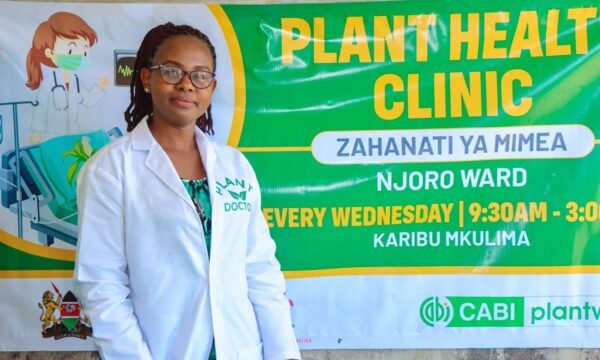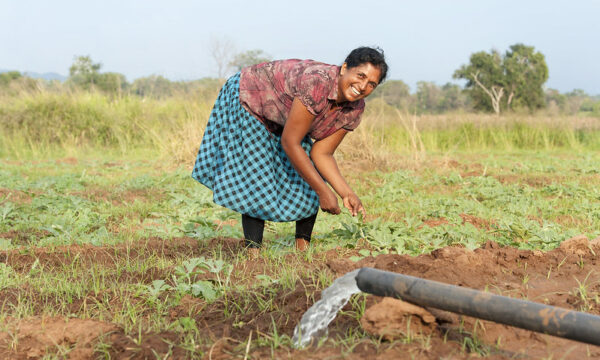
Jose Perez, Israel Cerros, Brígido Sosa, and Eddar Castillo at the JFPS plant clinic (from left)
The Cooperative Juan Francisco Paz Silva (JFPS), which was founded in 1990, began operating a plant clinic in 2009. The cooperative was looking for a way to provide technical support to its member farmers, and the plant clinic provided a means to do so. Initially, two technicians, Oscar Calderon and Harold Espinoza, were trained as plant doctors to provide technical support to farmers, and they in turn trained others technicians in the cooperative, including current plant doctor Israel Cerros. The plant clinic services are provided for free to about 500 farmers in nearby communities, of which 280 are member farmers of the cooperative.
According to Eddar Castillo, technical manager of the cooperative, prior to working with Plantwise, the cooperative did not have the capacity to provide diagnostic support because they did not have personnel with the knowledge of how to do plant diagnostics. Now the cooperative has a team that is trained and has the tools needed to provide good technical assistance. He estimates, with the technical support provided to farmers in diagnostics, management recommendations, and training, yields have increased by 25-30%, and in some specific cases the increase has been up to 100% because the advice given prevented the farmer from losing his entire crop.
Eddar sees the relationship between the plant doctor and farmers as symbiotic, with each party benefiting. “We have learned that there is a complementary relationship between the plant clinic and the producer, we learn from each other, and this is what has given better results for the cooperative”. Eddar believes “there is always something more to learn, you learn something new every day. If we complement the service of the plant clinic with the experience of farmers, the learning is much greater”.
The plant clinic has also allowed them to track insects and diseases affecting their farmers. “Attending to the farmer we detect things we need to learn” said Eddar. ”The plant clinic has allowed us to notice changes in the types of pests attacking the crops,” he explained “in sesame we are now finding many sucking insects, maya (Diabrotica), fungus and bacteria”.
The chain of sustainability

Plant doctor Israel Cerros attends to a client at the JFPS plant clinic
Funding for the clinic and related activities is provided through the sales of goods from the cooperative. The coop’s primary income is from the sale of sesame oil and seeds, most of which is exported to England (their main customer is The Body Shop which uses the oil to make body butter). In order to ensure long term sustainability, the Board has decided to diversify by adding coffee and horticulture crops. The cooperative integrates and coordinates all of its services, including credit, the plant clinic, and the agro-input supply store. If a producer does not have money to buy a recommended pesticide product, the cooperative will give the farmer the product on credit, and the producer will repay the cooperative at the end of the harvest. If the store does not carry the recommended product, the cooperative has an agreement with a local agro-input store to give the producer the product through a cooperative credit.
For José and Brígido, it is necessary to provide technical support to producers through the plant clinic, a link in the chain whose main role is to ensure the production of sesame, which is the main source of income for the cooperative. José said “right now we’re entering a new market (sesame to McDonalds), and the plant clinic will play a very important role to ensure product quality”. Farmers have all of their money invested in sesame production, so if the crop is attacked by a pest and they lose the crop, the farmer loses all of his/her income for the year. When a farmer loses his/her crop, the cooperative loses income as well. There is a strong incentive, therefore, for the cooperative to continue to provide technical support to its farmers. As Brígido Sosa explained, “the producer is the cooperative, we cannot see it separately”.
In addition to providing technical assistance to farmers, the JFPS cooperative has a strong gender policy. While farmers are the primary focus, the cooperative is also helping women start small businesses and build self-esteem. The cooperative is recognized by the United Nations as a pioneering business where the “unpaid work” of women is considered (e.g. raising children, cooking, cleaning, etc.). This means that for every manzana of sesame produced, 50 USD of profit goes into a fund to facilitate women to start their own business projects. Any woman from the family of one of the coop members can access an amount of 100 USD, but are required to contribute an equal amount. In addition to funds, the cooperative also provides them with training to stimulate business development. One of the primary projects this fund has assisted is a medicinal plants project that is managed by a group of 13 women called “Mujeres al Poder” (Women in Power).
Contributed by Erica Chernoh and Eduardo Hidalgo.
Plantwise in Nicaragua is coordinated by the Academic Plant Health Network (REDAF – Red Académica de Fitoprotección) through the University of León (Universidad Nacional Autónoma UNAN-León).
Related News & Blogs
How plant clinics are strengthening crop health services in Bangladesh
When the first-ever plant clinic in Bangladesh opened in Dhaka in 2013, it initially faced a lack of interest due to its novelty and limited awareness among farmers. However, it went on to expand, providing advice to over 17,000 farmers and led to the…
2 July 2025




